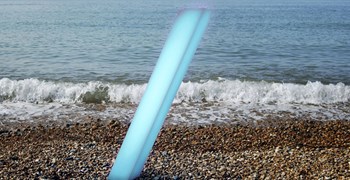10,000 miles on a dream: Keith Cunningham, the Royal College of Art great whose works were left unseen
This article originally appeared on Culture24.
A new exhibition in London, Unseen Paintings, is about to reveal some of the works left by artist Keith Cunningham in his studio following his death in 2014. Painting was Cunningham's private obsession, says Mike Dempsey.
 Keith Cunningham, Head No 7 (circa 1954-1960). Oil on canvas© Keith Cunningham, courtesy Keith Cunningham Estate. Photos: Sylvain Deleu
Keith Cunningham, Head No 7 (circa 1954-1960). Oil on canvas© Keith Cunningham, courtesy Keith Cunningham Estate. Photos: Sylvain DeleuEventually, he plucked up the courage to speak to him; from that point, Andrews took a keen interest in him, providing books on design and suggesting that he attend evening classes at East Sydney Technical College.
 Head No 11 (circa 1954-1960). Oil on canvas© Keith Cunningham, courtesy Keith Cunningham Estate. Photos: Sylvain Deleu
Head No 11 (circa 1954-1960). Oil on canvas© Keith Cunningham, courtesy Keith Cunningham Estate. Photos: Sylvain DeleuPost-war London was a grim place punctuated with bomb damage, rationing and smoke-induced smog. Clutching a single contact address, the David Jones store in Regent Street, Cunningham made a beeline for it.
 Head No 8 (circa 1954-1960). Oil on canvas© Keith Cunningham, courtesy Keith Cunningham Estate. Photos: Sylvain Deleu
Head No 8 (circa 1954-1960). Oil on canvas© Keith Cunningham, courtesy Keith Cunningham Estate. Photos: Sylvain DeleuWith a portfolio of work, he presented himself, unannounced, at Central St Martins’ reception. They took pity on this quietly spoken, shy individual who had travelled 10,000 miles on a dream.
 Skull No 5 (circa 1954-1960). Oil on canvas© Keith Cunningham, courtesy Keith Cunningham Estate. Photos: Sylvain Deleu
Skull No 5 (circa 1954-1960). Oil on canvas© Keith Cunningham, courtesy Keith Cunningham Estate. Photos: Sylvain DeleuHe supplemented his meagre living by washing dishes at local restaurants. But luck came when Andrews arrived from Australia to work as a consultant at the Design Research Unit, famously headed by Sir Misha Black.
 Head No 6 (circa 1954-1960). Oil on canvas© Keith Cunningham, courtesy Keith Cunningham Estate. Photos: Sylvain Deleu
Head No 6 (circa 1954-1960). Oil on canvas© Keith Cunningham, courtesy Keith Cunningham Estate. Photos: Sylvain DeleuOn graduating in 1952, Cunningham was left feeling unfulfilled and yearned for a deeper creative education. He was offered a place at the Royal College of Art along with a bursary and, at the suggestion of tutor Abram Games, he went to see Rodrigo Moynihan, then the head of painting.
 Dog (circa 1954-1960). Oil on canvas© Keith Cunningham, courtesy Keith Cunningham Estate. Photos: Sylvain Deleu
Dog (circa 1954-1960). Oil on canvas© Keith Cunningham, courtesy Keith Cunningham Estate. Photos: Sylvain DeleuAt last, his heart and mind were fully engaged. He worked furiously in this heady atmosphere of creativity at the RCA. The results impressed a clutch of Royal Academicians, including Sir Roger de Grey, Carel Weight and John Minton. Minton stated that Cunningham was “one of the most gifted painters to have been at the Royal College”.
 Fighting Dogs (circa 1954-1960). Oil on canvas© Keith Cunningham, courtesy Keith Cunningham Estate. Photos: Sylvain Deleu
Fighting Dogs (circa 1954-1960). Oil on canvas© Keith Cunningham, courtesy Keith Cunningham Estate. Photos: Sylvain DeleuWith his RCA bursary, he opted to explore Spain and later returned to London to complete his scholarship. During his RCA period, he exhibited at the Royal Academy’s Summer Exhibition, the Beaux Arts Gallery and, for two consecutive years, the prestigious London Group show.
 Still Life No 1 (circa 1954-1960). Oil on canvas© Keith Cunningham, courtesy Keith Cunningham Estate. Photos: Sylvain Deleu
Still Life No 1 (circa 1954-1960). Oil on canvas© Keith Cunningham, courtesy Keith Cunningham Estate. Photos: Sylvain DeleuInstead, he worked in the solitary atmosphere of his chapel studio in Battersea, where he would travel each day to work on his canvasses.
 Still Life No 2 (circa 1954-1960). Oil on canvas© Keith Cunningham, courtesy Keith Cunningham Estate. Photos: Sylvain Deleu
Still Life No 2 (circa 1954-1960). Oil on canvas© Keith Cunningham, courtesy Keith Cunningham Estate. Photos: Sylvain DeleuThe physicality of his work is evident in the build-up of manipulated paint and texture, creating a visceral, brooding intensity that vibrates the longer you gaze. Whatever was going through Cunningham’s mind in that lonely studio, it is encapsulated forever in this impressive body of work.
Keith Cunningham was an eternally guarded and secretive man: a man who had carefully balanced his life, using his design and teaching work to fund his private obsession for painting. He made art so deeply personal that he found it difficult to share it with others, even with his wife, for fear that it may lose something – perhaps in its integrity.
He died in 2014 with much of his life’s work stored in a studio left unseen. Through the determination of his wife Bobby Hillson and the sterling work of Stephen Rothholz, who were responsible for gathering the paintings to organise this show, Cunningham’s work can at last see the light of day.
- Keith Cunningham: Unseen Paintings 1954-1960 is at Hoxton Gallery, London from September 30 – October 13 2016.
Three places to see unmissable paintings
Scottish National Gallery of Modern Art, Edinburgh
The focused current display, Bridget Riley: Paintings, 1964-2015, brings together a group of major paintings by Riley spanning more than 50 years of the artist’s career to explore the dialogue between monochrome and colour in her practice. Until April 16 2017.
The Picturemakers, Powys
The Picturemakers is a collective of artists based in Mid Wales. In 2014, It produced, at the request of The Curator of the Radnorshire Museum, an exhibition of paintings, drawings and prints to commemorate the centenary of the start of The Great War. The exhibition is inspired by poems that gave witness to this catastrophic, world changing conflict and are included in the exhibition. Until October 21 2016.
Grosvenor Museum, Chester
The gallery is currently hosting two exquisite works: Gainsborough's Coastal Scene and Claude Lorraine's The Rest on the Flight into Egypt. Until September 18 2016.












